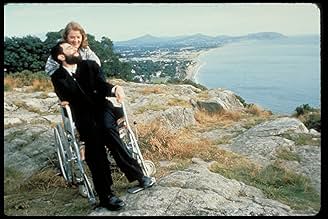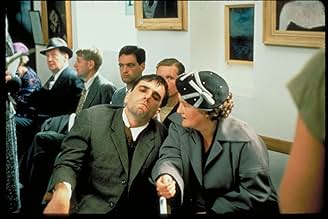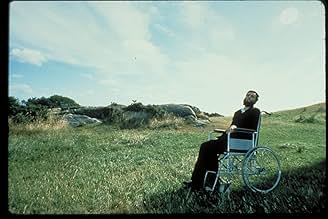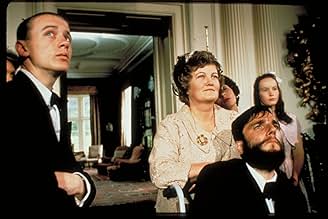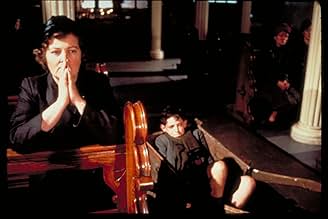अपनी भाषा में प्लॉट जोड़ेंChristy Brown, born with cerebral palsy, learns to paint and write with his only controllable limb - his left foot.Christy Brown, born with cerebral palsy, learns to paint and write with his only controllable limb - his left foot.Christy Brown, born with cerebral palsy, learns to paint and write with his only controllable limb - his left foot.
- निर्देशक
- लेखक
- स्टार
- 2 ऑस्कर जीते
- 23 जीत और कुल 20 नामांकन
Pat Laffan
- Barman
- (as Patrick Laffan)
Owen Sharpe
- Young Tom
- (as Owen Sharp)
फ़ीचर्ड समीक्षाएं
A noted cinematic phenomenon of the late eighties and early nineties was the number of Oscars which went to actors playing characters who were either physically or mentally handicapped. The first was Marlee Matlin's award for "Children of a Lesser God" in 1986, and the next ten years were to see another "Best Actress" award (Holly Hunter for "The Piano" in 1994) and no fewer than five "Best Actor" awards (Dustin Hoffman in 1988 for "Rain Man", Daniel Day-Lewis in 1989 for "My Left Foot", Al Pacino in 1992 for "Scent of a Woman", Tom Hanks in 1994 for "Forrest Gump" and Geoffrey Rush in 1996 for "Shine") for portrayals of the disabled. Matlin, who played a deaf woman, is herself deaf, but all the others are able-bodied.
This phenomenon aroused some adverse comment at the time, with suggestions being made that these awards were given more for political correctness than for the quality of the acting. When Jodie Foster failed to win "Best Actress" for "Nell" in 1994 some people saw this as evidence of a backlash against this sort of portrayal. My view, however, is that the majority of these awards were well deserved. I thought the 1992 award should have gone to either Clint Eastwood or Robert Downey rather than Pacino, but apart from that the only one with which I disagreed would have been Hanks', and that was because I preferred Nigel Hawthorne's performance in "The Madness of King George". In that film, of course, Hawthorne played a character who was mentally ill.
"My Left Foot" was based upon the autobiography of the Irish writer and painter Christy Brown. Brown was born in 1931, one of the thirteen children of a working-class Dublin family. He was born with cerebral palsy and was at first wrongly thought to be mentally handicapped as well. He was for a long time incapable of deliberate movement or speech, but eventually discovered that he could control the movements of one part of his body, his left foot (hence the title). He learned to write and draw by holding a piece of chalk between his toes, and went on to become a painter and a published novelist and poet.
Life in working-class Dublin in the thirties and forties could be hard, and the city Jim Sheridan (himself a Dubliner) shows us here is in many ways a grim, grey, cheerless place, very different from our normal idea of the "Emerald Isle". (Sheridan and Day-Lewis were later to collaborate on another film with an Irish theme, "In the Name of the Father"). Against this, however, must be set the cheerfulness and spirit of its people, especially the Brown family. Much of Christy's success was due to the support he received from his parents, who refused to allow him to be institutionalised and always believed in the intelligence hidden beneath a crippled exterior, and from his siblings. We see how his brothers used to wheel him round in a specially-made cart and how they helped their bricklayer father to build Christy a room of his own in their back yard.
The film could easily have slid into sentimentality and ended up as just another heart-warming "triumph over adversity" movie. That it does not is due to a number of factors, principally the magnificent acting. In the course of his career, Day-Lewis has given a number of fine performances, but this, together with the recent "There Will Be Blood", is his best. He is never less than 100% convincing as Christie; his tortured, jerky movements and strained attempts at speech persuade us that we really are watching a disabled person, even though, intellectually, we are well aware that Day-Lewis is able-bodied. The other performances which stand out are from Fiona Shaw as his mentor Dr Eileen Cole, from Hugh O'Conor as the young Christy and from Brenda Fricker as Christy's mother (which won her the "Best Supporting Actress" award).
The other reason why the film escapes sentimentality is that it does not try to sentimentalise its main character. Christy Brown had a difficult life, but he could also be difficult to live with, and the film gives us a "warts and all" portrait. He was a heavy drinker, given to foul language and prone to outbursts of rage. He could also be selfish and manipulative of those around him, and the film shows us all these aspects of his character. Of course, it also shows us the positive aspects- his courage, his determination and his wicked sense of humour. Day-Lewis's acting is not just physically convincing, in that it persuades us to believe in his character's disability, but also emotionally and intellectually convincing, in that it brings out all these different facets of Christy's character. His Oscar was won in the teeth of some very strong opposition from the likes of Robin Williams and Kenneth Branagh, but it was well deserved. 8/10
This phenomenon aroused some adverse comment at the time, with suggestions being made that these awards were given more for political correctness than for the quality of the acting. When Jodie Foster failed to win "Best Actress" for "Nell" in 1994 some people saw this as evidence of a backlash against this sort of portrayal. My view, however, is that the majority of these awards were well deserved. I thought the 1992 award should have gone to either Clint Eastwood or Robert Downey rather than Pacino, but apart from that the only one with which I disagreed would have been Hanks', and that was because I preferred Nigel Hawthorne's performance in "The Madness of King George". In that film, of course, Hawthorne played a character who was mentally ill.
"My Left Foot" was based upon the autobiography of the Irish writer and painter Christy Brown. Brown was born in 1931, one of the thirteen children of a working-class Dublin family. He was born with cerebral palsy and was at first wrongly thought to be mentally handicapped as well. He was for a long time incapable of deliberate movement or speech, but eventually discovered that he could control the movements of one part of his body, his left foot (hence the title). He learned to write and draw by holding a piece of chalk between his toes, and went on to become a painter and a published novelist and poet.
Life in working-class Dublin in the thirties and forties could be hard, and the city Jim Sheridan (himself a Dubliner) shows us here is in many ways a grim, grey, cheerless place, very different from our normal idea of the "Emerald Isle". (Sheridan and Day-Lewis were later to collaborate on another film with an Irish theme, "In the Name of the Father"). Against this, however, must be set the cheerfulness and spirit of its people, especially the Brown family. Much of Christy's success was due to the support he received from his parents, who refused to allow him to be institutionalised and always believed in the intelligence hidden beneath a crippled exterior, and from his siblings. We see how his brothers used to wheel him round in a specially-made cart and how they helped their bricklayer father to build Christy a room of his own in their back yard.
The film could easily have slid into sentimentality and ended up as just another heart-warming "triumph over adversity" movie. That it does not is due to a number of factors, principally the magnificent acting. In the course of his career, Day-Lewis has given a number of fine performances, but this, together with the recent "There Will Be Blood", is his best. He is never less than 100% convincing as Christie; his tortured, jerky movements and strained attempts at speech persuade us that we really are watching a disabled person, even though, intellectually, we are well aware that Day-Lewis is able-bodied. The other performances which stand out are from Fiona Shaw as his mentor Dr Eileen Cole, from Hugh O'Conor as the young Christy and from Brenda Fricker as Christy's mother (which won her the "Best Supporting Actress" award).
The other reason why the film escapes sentimentality is that it does not try to sentimentalise its main character. Christy Brown had a difficult life, but he could also be difficult to live with, and the film gives us a "warts and all" portrait. He was a heavy drinker, given to foul language and prone to outbursts of rage. He could also be selfish and manipulative of those around him, and the film shows us all these aspects of his character. Of course, it also shows us the positive aspects- his courage, his determination and his wicked sense of humour. Day-Lewis's acting is not just physically convincing, in that it persuades us to believe in his character's disability, but also emotionally and intellectually convincing, in that it brings out all these different facets of Christy's character. His Oscar was won in the teeth of some very strong opposition from the likes of Robin Williams and Kenneth Branagh, but it was well deserved. 8/10
Christy Brown is born with cerebral palsy. His father (Ray McAnally) refuses to give him up and he learns to live with controlling only his left foot. His loving mother (Brenda Fricker) tirelessly raise him. As a child (Hugh O'Conor), everybody assumed that he's a simpleton until he wrote MOTHER with chalk. As a young man (Daniel Day-Lewis), he is rejected by the pretty girl. His father loses his job and becomes abusive. He falls for Dr. Cole (Fiona Shaw) treating his cerebral palsy but she's engaged. As an older man, he falls for his nurse Sheila (Alison Whelan).
It's a tough way to act for Daniel Day-Lewis. It's not just the physicality but he has to make sense despite his speech pattern. He has to be understandable without speaking understandable English. It's his anger and his unlikeability that brings out his humanity. He's not playing a saint or a caricature. It's a real person. It's an all-around performance.
It's a tough way to act for Daniel Day-Lewis. It's not just the physicality but he has to make sense despite his speech pattern. He has to be understandable without speaking understandable English. It's his anger and his unlikeability that brings out his humanity. He's not playing a saint or a caricature. It's a real person. It's an all-around performance.
Daniel Day Lewis is one of the best actors of our time and one of my favorites. It is amazing how much he throws himself in each of the characters he plays making them real.
I remember, many years ago, we had a party in our house - the friends came over, we were sitting around the table, eating, drinking the wine, talking, laughing - having a good time. The TV was on - there was a movie which we did not pay much attention to. Then, suddenly, all of us stopped talking and laughing. The glasses did not clink, the forks did not move, the food was getting cold on the plates. We could not take our eyes off the screen where the young crippled man whose entire body was against him and who only had a control over his left foot, picked up a piece of chalk with his foot and for what seemed the eternity tried to write just one word on the floor. When he finished writing that one word, we all knew that we had witnessed not one but three triumphs - the triumph of a human will and spirit, the triumph of the cinema which was able to capture the moment like this on the film, and the triumph of an actor who did not act but who became his character.
Jim Sheridan's "My Left Foot" is an riveting, unsentimental bio-drama about Christy Brown, the man who was born with cerebral palsy in a Dublin slum; who became an artist and a writer and who found a love of his life.
I like every one of Day Lewis's performances (I have mixed feelings about his performance in GONY) but I believe that his greatest role was Christy Brown in "My Left Foot"
I remember, many years ago, we had a party in our house - the friends came over, we were sitting around the table, eating, drinking the wine, talking, laughing - having a good time. The TV was on - there was a movie which we did not pay much attention to. Then, suddenly, all of us stopped talking and laughing. The glasses did not clink, the forks did not move, the food was getting cold on the plates. We could not take our eyes off the screen where the young crippled man whose entire body was against him and who only had a control over his left foot, picked up a piece of chalk with his foot and for what seemed the eternity tried to write just one word on the floor. When he finished writing that one word, we all knew that we had witnessed not one but three triumphs - the triumph of a human will and spirit, the triumph of the cinema which was able to capture the moment like this on the film, and the triumph of an actor who did not act but who became his character.
Jim Sheridan's "My Left Foot" is an riveting, unsentimental bio-drama about Christy Brown, the man who was born with cerebral palsy in a Dublin slum; who became an artist and a writer and who found a love of his life.
I like every one of Day Lewis's performances (I have mixed feelings about his performance in GONY) but I believe that his greatest role was Christy Brown in "My Left Foot"
I can still remember the fuss that was made when this movie was first released. Everybody was applauding it. 14 years down the line the film is very dated, but still very enjoyable but more importantly very powerful. The story centers around Poet, artist and author to be Christy Brown. He suffers from Celerbal Paulsy (I hope that is spelled right) which means to be all three of the above occupations is some feat that should not go unnoticed. He lives in a large family (13 children, not all who suffered) in a small terraced house in Dublin's City Center. The movie begins with his birth and the late great Ray Mc Nally being told by a nurse that there were complications during the birth. We move forward a couple years to where we see a young Christy (played by Hugh O'Connor) being helped around by his mother. It is a sad sight to see him underneath the stairs of his family home watching his brothers and sisters (all Abled bodied) living a normal lifestyle (despite being poor) and knowing that he is just as well able to communicate. The finest scene in this early stage of his life is when Christy writes for the first time. In front of his family. His father is sceptical at first however his opinion is reversed when Christy finally proves that he is not the idiot that everybody thinks him to be. We then move to Christy's later teenage years where he meets a nurse with whose help he begins to learn how articulate his words. However Christy becomes infatuated with this lady. His mother is delighted that her son is happy however his father is once again the sceptic but this time he has good cause to as Christy's heart is broken when this woman announces that she is engaged to an Art dealer. This film is brilliant and I have a massive amount of praise for Daniel Day-Lewis who portrays Christy as an angry young man who is coming to terms with everything in his life. He is disturbed by womens reluctance to accept him and his condition, He is fed up of his fathers treatment of his mother and his siblings. Day-Lewis is totally immersed in his character and it is one of his finest roles. I have seen old interviews with the real Christy Brown and I can safely say that it is hard at times to distinguish is it Christy Brown or Daniel Day-Lewis on the screen. However the show is stolen from him by the finer performances of young Hugh O'Connor and Ray Mc Nally. Both of whom should have got Oscars as Best Supporting Actor (O'Connor) and Best Actor (Ray Mc Nally). O'Connor definitely proves himself in the role because he portrays the same qualities that Day-Lewis does as a frustrated youngster. Mc Nally defines the typical Irish Father role that would be made humorous by Colm Meaney in a number of films. It is such a great pity that he died shortly after this film. Brenda Fricker must also be mentioned as the doting mother who does everything that she can to help Christy reach his full potential. Again she is life like to Christy Browns real life mother however I think there were more deserving people for that Best Supporting Actress Oscar. This film is an amazing piece of independent film making and it really does so the potential of Jim Sheridan as a director and actor. He would further develop the themes of family, Irish society, loyalty in his other films. 9 out of 10.
10llltdesq
Let me state at the outset that I have Cerebral Palsy and I went into this film expecting to have to make allowances for the lead performance. I left the theater half-convinced that they'd cast an actor who had Cerebral Palsy in the role, even though I knew that was not the case. The performances were generally excellent, with a special nod to Brenda Fricker and to Hugh O'Conner (I believe that's his name) as the young Christy Brown. Christy is talented, brash, arrogant, at times vulgar and petulant-in other words, human. This film, along with Gaby: A True Story and the documentary King Gimp, are excellent portrayals of life with CP. By no means a complete portrait, but fine examples of the disabled as human beings. Most highly recommended.
क्या आपको पता है
- ट्रिवियाAccording to the "Making of My Left Foot" segment on the Special Edition DVD, Sir Daniel Day-Lewis broke two ribs during filming from assuming the hunched-over position in his wheelchair for weeks of filming. He also would refuse to come out of character. On visits to the set canteen, other people would have to help him with food. On one visit from his English agent, Day-Lewis again refused to come out of character as Christy Brown, and his frustrated agent took off.
- गूफ़In the beginning of the movie, when Mary Carr gets Christy Brown into the library, the shadow of the boom mic can clearly be seen on a white door.
- भाव
Christy Brown: I've had nothing but Platonic love all me life. Do you know what I say? FUCK PLATO! And fuck all love that's not a hundred percent commitment!
- साउंडट्रैकFoggy Dew
(uncredited)
Traditional
टॉप पसंद
रेटिंग देने के लिए साइन-इन करें और वैयक्तिकृत सुझावों के लिए वॉचलिस्ट करें
- How long is My Left Foot?Alexa द्वारा संचालित
विवरण
- रिलीज़ की तारीख़
- कंट्री ऑफ़ ओरिजिन
- आधिकारिक साइटें
- भाषा
- इस रूप में भी जाना जाता है
- Mi pie izquierdo: la historia de Christy Brown
- फ़िल्माने की जगहें
- उत्पादन कंपनियां
- IMDbPro पर और कंपनी क्रेडिट देखें
बॉक्स ऑफ़िस
- बजट
- £6,00,000(अनुमानित)
- US और कनाडा में सकल
- $1,47,43,391
- US और कनाडा में पहले सप्ताह में कुल कमाई
- $41,165
- 12 नव॰ 1989
- दुनिया भर में सकल
- $1,47,43,391
इस पेज में योगदान दें
किसी बदलाव का सुझाव दें या अनुपलब्ध कॉन्टेंट जोड़ें



